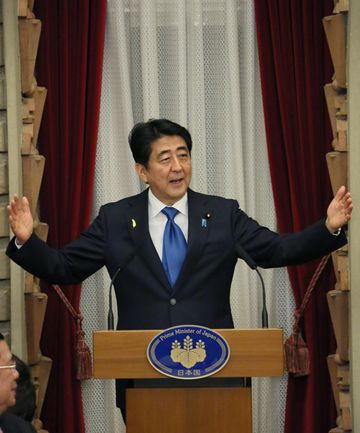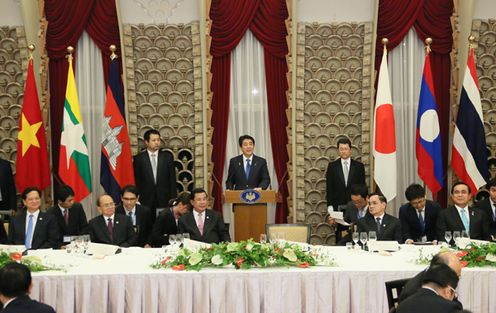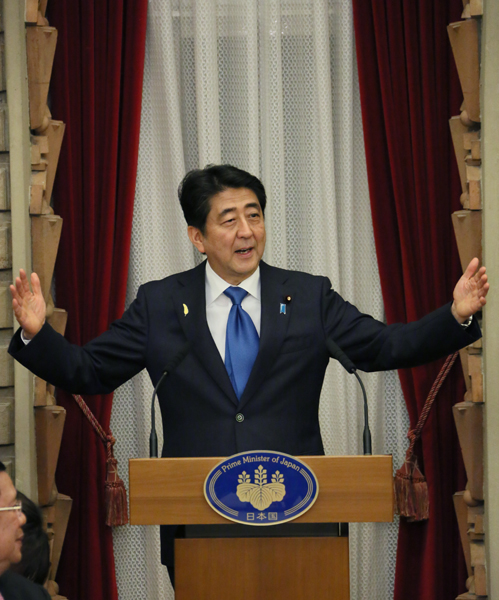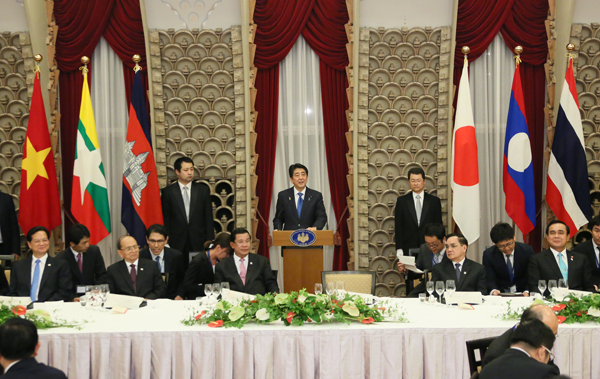Home > News > The Prime Minister in Action > July 2015 > Mekong-Japan Summit Meeting and Welcome Banquet Hosted by the Prime Minister
The Prime Minister in Action
Mekong-Japan Summit Meeting and Welcome Banquet Hosted by the Prime Minister
July 3, 2015

Photograph of the Prime Minister delivering an address (1)

Photograph of the Prime Minister delivering an address (2)
[Provisional Translation]
Prime Minister Shinzo Abe hosted a welcome dinner banquet at the Prime Minister’s Official Residence, inviting people involved with the Seventh Mekong-Japan Summit Meeting.
In his opening address, the Prime Minister said,
“I am pleased to welcome all of our friends from the Mekong region to Tokyo, and to be able to hold the Mekong-Japan Summit Meeting.
After assuming the office of Prime Minister, the Mekong region was the first overseas location I visited. Ever since then, each time I have visited the Mekong region, I have been charmed by its rich land, vibrant economy, and culture.
The Mekong region, which is carrying out strong development initiatives, is now a promising growth partner for Japan. The public and private sectors in Japan will continue to cooperate for ‘high quality growth’ there.
Many people, including those in the financial and cultural fields, are working hard for multifaceted relations between Japan and the Mekong region. I would like to use this opportunity to once again offer my sincere gratitude to you all.
Concerning work-related discussion, tomorrow we will have an in-depth exchange of opinions, but tonight, I would like everyone to relax and enjoy dinner.
People are talking right now about the steady advance of Nadeshiko Japan, the women’s national football team of Japan. In terms of soccer, alongside the summit meeting this time, we have invited representatives of the generation that will participate in the 2020 Tokyo Olympics from each of the Mekong region countries, all under 15 years of age, to have them deepen exchanges with members of their same generation from Japan. I look forward to seeing participants in the Tokyo Olympics emerge from their ranks.
Organized plays centering on short passes is characteristic of Japanese soccer. Actually, this style of play came to Japan approximately 100 years ago through Kyaw Din, a citizen of Myanmar who was studying in Japan, and it later became a foundation of soccer in Japan.
Through this history of exchange, right now in Viet Nam, Japanese citizens are actually coaching both the men’s and women’s soccer teams. Also, Cambodia will be Japan’s next opponent in the second-round qualifier for the 2018 World Cup in Russia. I look forward to a fair match.
I hope that all six of us leaders will make this summit a success through short passes between us and organized plays.
I would now like to raise a toast to the success of the Mekong-Japan Summit Meeting and the bright future of both Japan and the Mekong region.”


